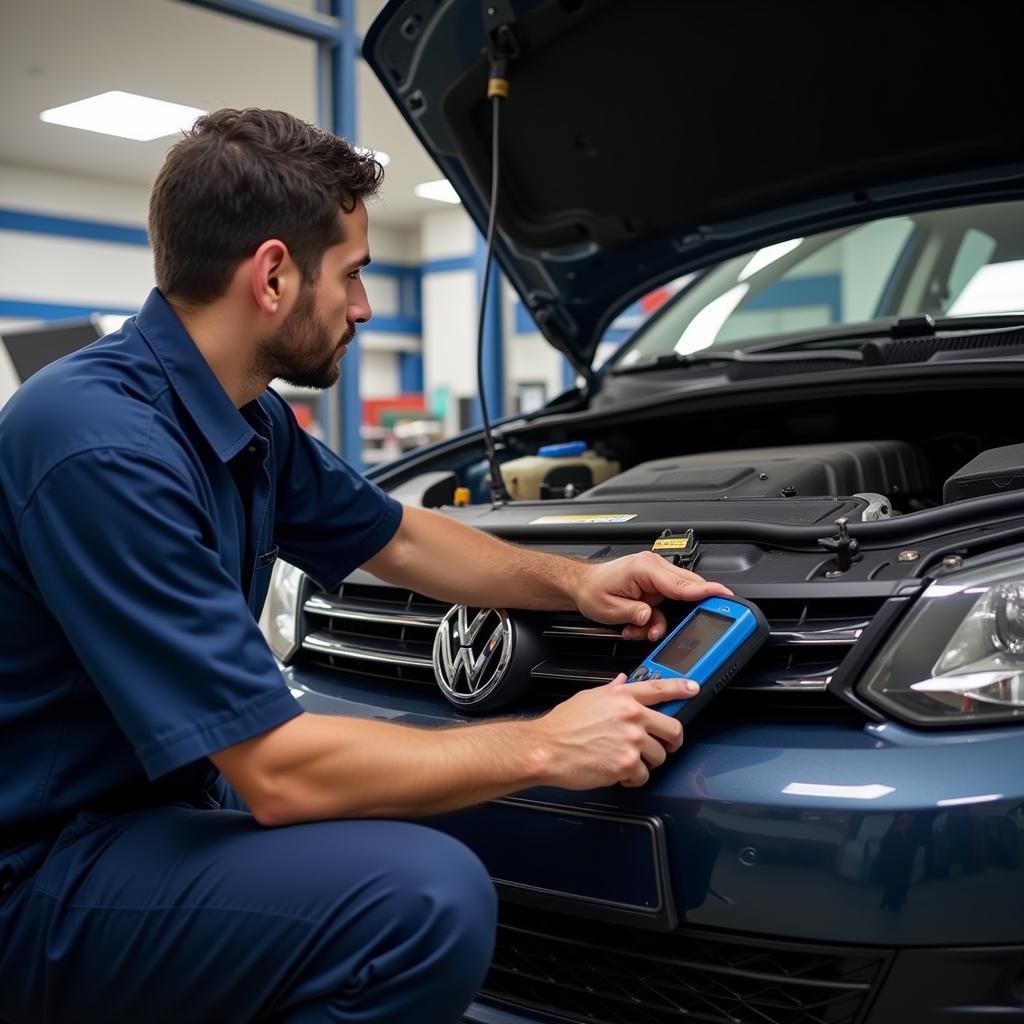Your cart is currently empty!

Understanding and Fixing VW Code P3130
The dreaded check engine light can be a source of anxiety for any car owner, especially when it throws up an unfamiliar code like P3130. For Volkswagen (VW) owners, this code specifically points to a potential issue with the “NOx Sensor Circuit Bank1 Sensor 2.” While this might sound intimidating, understanding what this code means and the common causes can empower you to address the problem effectively.
What Does VW Code P3130 Mean?
In simple terms, the P3130 code indicates that your car’s engine control module (ECM) has detected a problem with the NOx sensor circuit, specifically the one located downstream of the catalytic converter on engine bank 1. The NOx sensor plays a crucial role in monitoring the levels of nitrogen oxides (NOx) emitted by your VW’s engine. These emissions are harmful pollutants, and the sensor helps ensure your car meets environmental standards.
When the ECM detects a problem with the NOx sensor circuit, it triggers the check engine light and stores the P3130 code.
Common Causes of VW Code P3130
Several factors can lead to a P3130 code in your VW, including:
- Faulty NOx Sensor: This is the most common culprit. Like any other sensor, the NOx sensor can wear out over time, leading to inaccurate readings or complete failure.
- Wiring Issues: Damaged, corroded, or loose wiring within the NOx sensor circuit can disrupt the signal transmission, triggering the code.
- Exhaust Leaks: Leaks in the exhaust system, particularly before the NOx sensor, can affect the sensor’s readings and lead to a P3130 code.
- Faulty Catalytic Converter: While less common, a malfunctioning catalytic converter can also contribute to NOx sensor issues and trigger the code.
Troubleshooting and Fixing VW Code P3130
Addressing a P3130 code often involves a systematic approach to pinpoint the root cause and implement the correct fix. Here are some steps you can take:
- Verify the Code: Before diving into repairs, use an OBD-II scanner to confirm that the P3130 code is the active issue.
- Inspect the NOx Sensor: Visually inspect the NOx sensor for any visible signs of damage, such as physical impact or corrosion. Check the wiring harness for any loose connections, broken wires, or signs of damage.
- Check for Exhaust Leaks: Inspect the exhaust system, particularly the area around the NOx sensor, for any leaks. Even small leaks can impact the sensor’s readings.
- Test the NOx Sensor: If the visual inspection doesn’t reveal any obvious issues, consider testing the NOx sensor using a multimeter. This can help determine if the sensor is functioning within the correct parameters.
- Consult a Professional: If you’re uncomfortable with the diagnosis or repair process, it’s best to consult a qualified mechanic specializing in VW vehicles.
 VW Mechanic Diagnosing NOx Sensor
VW Mechanic Diagnosing NOx Sensor
“It’s crucial to address NOx sensor issues promptly,” says Mark Stevenson, a senior automotive technician at VCDSTool. “Ignoring them can lead to increased emissions, reduced fuel efficiency, and potentially more expensive repairs down the line.”
FAQs about VW Code P3130
Q1: Can I drive my VW with a P3130 code?
A: While you might be able to drive for a short period, it’s not recommended. Driving with a faulty NOx sensor can impact your car’s emissions, fuel economy, and potentially lead to further damage.
Q2: How much does it cost to replace a VW NOx sensor?
A: The cost can vary depending on your VW model and labor costs in your area. However, expect to pay between $300 and $800 for parts and labor.
Q3: Can I replace the NOx sensor myself?
A: If you have some mechanical skills and the right tools, you might be able to replace the sensor yourself. However, keep in mind that working on exhaust systems can be challenging and potentially dangerous.
Q4: Will clearing the code fix the problem?
A: While clearing the code might temporarily turn off the check engine light, it won’t address the underlying problem. The code will likely reappear if the issue persists.
“Don’t hesitate to reach out for expert help if you’re unsure about any step of the process,” adds Stevenson. “At VCDSTool, we’re always happy to provide guidance and support to help you get back on the road safely.”
If you need any assistance in diagnosing or fixing your car troubles, please do not hesitate to contact us at +1 (641) 206-8880 and our email address: vcdstool@gmail.com or visit our office at 6719 W 70th Ave, Arvada, CO 80003, USA. Our team of expert technicians at VCDSTool is dedicated to providing top-notch car maintenance and repair services to keep your vehicle running smoothly.
by
Tags:
Leave a Reply